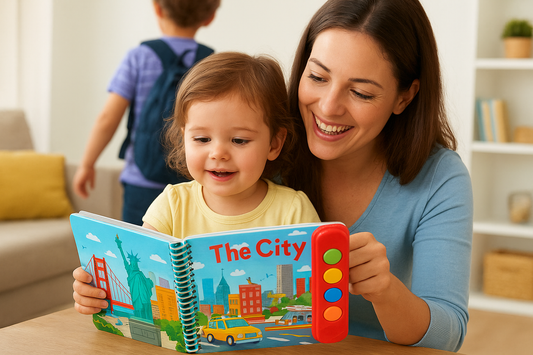In today's tech-savvy world, it’s tempting to rely on screens to entertain or educate our little ones. But did you know that excessive screen time for toddlers can impact their attention span, language development, and social skills?
While technology has its place, it's important to balance it with hands-on, interactive activities that foster real-world learning. This is where screen-free time becomes invaluable for a child's early development.
Why Screen-Free Time Matters
When toddlers engage in activities that don’t involve screens, like playing with toys or flipping through interactive soundboard books, they activate different areas of the brain that help with focus, motor skills, and creativity. Screen-free time encourages them to explore the world around them, promoting problem-solving skills and boosting their imagination.
Interactive Books: A Perfect Alternative
Interactive soundboard books offer a fun and educational way to keep toddlers engaged without screens. Books that combine music, storytelling, and hands-on elements encourage young children to explore sounds, develop hand-eye coordination, and improve language skills. With buttons shaped in unique ways, toddlers can learn through sensory play and enjoy the soothing effects of music at the same time. Check one of our most popular book here.
Building Bonds and Encouraging Learning
Reading a book together creates an opportunity for quality bonding time with your child. It allows you to sit side by side, interact, and create special moments. Soundboard books, especially those with familiar lullabies and songs, offer a shared experience that enhances learning and makes reading fun for toddlers.
How to Introduce More Screen-Free Activities
Start by designating specific times of the day for screen-free play, such as during meals, before naps, or as part of a bedtime routine. Introduce soundboard books, puzzles, or sensory toys that will grab your toddler’s attention. The key is to create an engaging environment that balances learning and play without relying on screens.
By providing children with soundboard books and other screen-free alternatives, you’re giving them the tools to explore their surroundings, develop essential life skills, and enjoy meaningful, creative play. It’s a simple way to enrich their daily routines while offering a break from the digital world.





